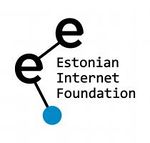Estonian Internet Foundation
 | |
| Founded: | 2009 |
| Headquarters: | Paldiski mnt 80 10617 Tallinn |
| Country: | Estonia |
| Website: | internet.ee |
Estonian Internet Foundation, or EIF, operates the country code top-level domain of Estonia, .ee. It is a not-for-profit foundation established in 2009 by the Ministry of Economic Affairs and Communications and the Estonian Association of Information Technology and Telecommunications.[1]
History[edit | edit source]
The ccTLD .ee was introduced in 1992 and was operated by EENet until July 2010. The administrator of .ee domain was the academician Endel Lippmaa and Jaak Lippmaa.[1] There was a limit of one domain name per legal entity, valid registrations were free of charge.
Estonian Internet Foundation took over .ee ccTLD registry functions from EENet on July 5th, 2010.[1] All existing domains registered before the transition had to be re-registered during a 6 month transition period which ended on 5 January 2011.
Usage[edit | edit source]
New .ee domain rules allow unlimited number of domains to be registered by a single entity. Private persons can now register domains directly under .ee. Foreign entities can now register .ee domains although all domains must have an administrative contact with residence in Estonia. Domain disputes will be handled by Domain Disputes Committee.
Registration services can be done through accredited registrars listed on Estonian Internet Foundation website.[1] Domains can be registered and renewed for one, two or three years. The registration fee for registrars is set to 12, 23 or 33 Euros plus tax in 2014 depending on the registration period.
Third-level Domain Names[edit | edit source]
- .com.ee – companies (incorporated entities) as defined in the Commercial Code.
- .pri.ee – individuals.
- .fie.ee – self-employed people (sole proprietors) as defined in the Commercial Code.
- .med.ee – medical/health care institutions.
Education[edit | edit source]
EIF created a tutorial video for DNSSEC after their deployment of it in January 2014. The video's publication was supported by the European Union Structural Funds programme, Raising Public Awareness about the Information Society, and can be seen below.[1]
<iframe src="https://player.vimeo.com/video/91504543" width="600" height="338" frameborder="0" webkitallowfullscreen mozallowfullscreen allowfullscreen></iframe>
To ensure the security of your online visitors, you can protect your website with the DNSSEC security keys.
References[edit | edit source]